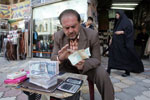 Reuters: Iranian merchants closed their shops in Tehran’s main bazaar on Saturday to protest government plans to raise value-added tax (VAT), a website said, in a move which represents a new challenge to President Mahmoud Ahmadinejad.
Reuters: Iranian merchants closed their shops in Tehran’s main bazaar on Saturday to protest government plans to raise value-added tax (VAT), a website said, in a move which represents a new challenge to President Mahmoud Ahmadinejad.
By Parisa Hafezi
 TEHRAN, Sept 25 (Reuters) – Iranian merchants closed their shops in Tehran’s main bazaar on Saturday to protest government plans to raise value-added tax (VAT), a website said, in a move which represents a new challenge to President Mahmoud Ahmadinejad.
TEHRAN, Sept 25 (Reuters) – Iranian merchants closed their shops in Tehran’s main bazaar on Saturday to protest government plans to raise value-added tax (VAT), a website said, in a move which represents a new challenge to President Mahmoud Ahmadinejad.
Bazaar merchants wield significant economic and political power in Iran and, with the help of influential clerics, they mobilised protests that overthrew the country’s monarch in 1979.
A strike by the influential Grand Bazaar increases pressure on Ahmadinejad, whose policies have deepened in-fighting among the hardline leadership since his disputed re-election in 2009. Authorities have denied opposition claims the vote was rigged.
“The gold sellers section of Tehran’s Grand Bazaar was closed down on Saturday in protest at the government’s plan to implement higher taxes,” the opposition website Kaleme reported.
The semi-official Fars news agency said shopkeepers resumed their activities after negotiations with officials.
The government’s decision in July to increase the VAT by as much as 70 percent on certain goods sparked strikes in Tehran and other cities, forcing the government to back down.
The tax is meant to compensate for a shortfall in oil revenues as a result of the sharp fall in oil prices. The world’s fifth biggest producer of crude oil, Iran’s economy is more than 60 percent dependent on oil income.
Sanctions imposed by the United States and its allies, who suspect Iran is seeking a nuclear bomb, are also a threat to the economy. Tehran says its nuclear programme is for peaceful power generation purposes.
Since its implementation in 2008, the VAT rate has been raised annually by between six and 15 percent, depending on the goods. A strike in 2008, the first major protest by bazaar merchants since the fall of the Shah, convinced Iran’s government to put off a new VAT reform for two months.
“DEEP TENSIONS”
Analysts say the bazaar protests reflect “deep tensions” in the Islamic state. Some hardliners, including clerics, have openly criticised Ahmadinejad for his policies.
“The rulers cannot ignore bazaar merchants. Bazaar merchants have the backing of powerful clerics,” said a political analyst who asked not to be named.
The tax forms part of a broader economic reform package by Ahmadinejad’s government, including a bill to end subsidies on energy and food. Critics say carrying out the subsidy bill will increase the cost of living in Iran.
Economists support cutting subsidies but fear it may further exacerbate the Islamic state’s economic instability.
A survey by parliament’s research centre said inflation stood around 50 percent. The official inflation rate is 8.8 percent. The government has been criticised by some top hardline clerics for providing false economic figures.
The clerical establishment is trying to avoid any public discontent that may revive post-election anti-government street protests. Iran’s election last year triggered the worst domestic unrest since the revolution.
The subsidy bill was scheduled to take effect in September, but it was delayed by the government amid growing concern over public discontent, particularly among poor and middle class.
(Editing by Noah Barkin)


